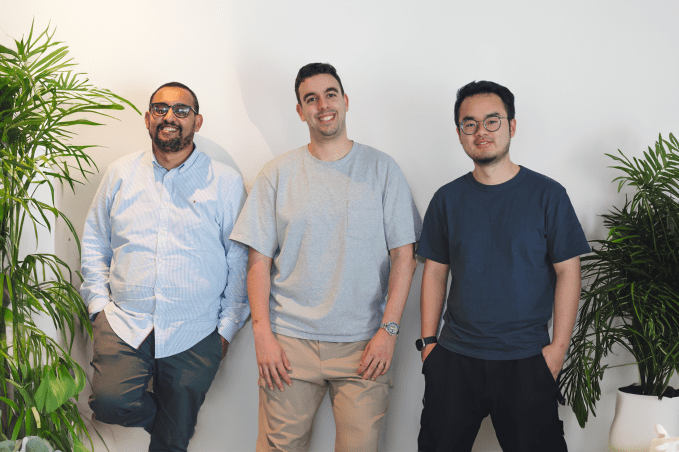Many doctors are overwhelmed by paperwork, leaving them stretched thin, with less time to see patients. Based in Melbourne with plans to expand around the world, Heidi Health wants to ease the burden of administrative tasks by using AI to turn consultation transcripts into case histories, referral letters, financial forms and other documents. It also builds detailed clinical histories for providers and patients, helping them get more out of each visit.
Heidi Health announced today that it has raised $10 million AUD (about $6.4 million USD) in Series A funding. The round was led by Blackbird Ventures with participation from Hostplus, Vesta, Wormhole Capital, Archangel Ventures, Possible Ventures and Daniel Ventures.
Formerly called Oscer, Heidi is now used by more than 100 general practitioners in about 30 clinics throughout Australia. Heidi was founded in 2021 by vascular surgeon Dr. Thomas Kelly, Waleed Mussa and Yu Liu.
Like many countries around the world, Australia is experiencing a shortage of GPs. Alongside being overworked, physicians also have to do a staggering amount of paperwork. One study found that physicians spend twice as much time on paperwork as they do seeing patients, leading to burnout.
As a doctor, Dr. Kelly says he “lived the pain that we’re trying to solve with Heidi” while working in an outpatient clinic where there were often 60 to 70 patients for just 30 time slots.
“Most of my time as a clinician was spent doing administrative things, not things I learned in medical school,” Dr. Kelly said. “It was filling out forms dealing with billing, payments and claims, creating different referrals and summaries, waiting on hold, just this bureaucracy of a health system to navigate.”
Building “memory banks”
In 2017 he encountered ChatGPT-2 and, along with Mussa and Liu, saw its potential to reduce medical administrative work by performing tasks like creating documentation and finding the latest guidelines.
“There are so many horror stories that I think what we’re building at Heidi could avoid,” said Dr. Kelly. He describes seeing patients who needed a toe or foot amputated because they had a vascular condition, but didn’t get diagnosed in time because of long waiting lists for a consultation. By reducing administrative work, Heidi can shorten wait times, while its AI tools can prompt doctors to check for conditions. The clinical histories it creates can be shared with other providers for context.
Heidi works by first recording consultations. Then it will analyze the transcript, create clinical notes and give doctors prompts like “have you thought of a vascular condition.” It will also relate a patient’s new symptoms to ones mentioned in previous visits, or flag potentially urgent cases. These records are kept as patient histories, building what Dr. Kelly refers to as memory banks for each person. “The direction of the product we want to go in is turning each recording into that context for every future visit,” he says.

One feature Dr. Kelly highlights is My Additions, which lets clinicians interact with transcripts by annotating them while Heidi is recording. This makes sense for things clinicians want to note, but not say to a patient (for example, comments about their appearance). Once a recording is done, clinicians use it to generate paperwork like medical certificates, referral letters to another doctor and anything else that needs a specific format.
On the patient’s side, Heidi can help them get more out of their visit. Before the appointment, clinicians provide patients with a link to a questionnaire that asks them about their health issues, so they don’t need to rush during their exam. This also helps doctors build more comprehensive health history. Dr. Kelly says one of the startup’s plans is to enable patients to keep their own records of all their visits, so they can refer to them or send them to other clinicians.
Heidi also recently launched an AGI (artificial general intelligence) product called Heidi for Clinicians that lets users automate administrative work like patient histories, ward round lists, clinical audits, clinical notes, documents and discharge summaries for billings and processing referrals.
The startup plans to introduce more products centered around its clinical histories for patients. This includes tools that will give doctors context about how symptoms have changed over time, highlighting patients that need further examination, as well as people they haven’t seen in a while.
Heidi can be used off-the-shelf or as a white-label solution. For larger practices and healthcare systems, it can be integrated into practice management software like Epic or Athena for use in things like chat-based consults and telehealth services. As an off-the-shelf product, doctors can sign into Heidi’s website and start recording their consultation from there. Providers that use Heidi range in size from clinics with as few as three or four doctors to as many as 30. It also serves groups with 50 to 250 clinics.
The startup’s target customer for its standalone products is any type of clinician, but especially general practitioners because of how much work they need to do, Dr. Kelly says.
“Historically, you could just walk into a primary care like a GP practice and get a visit. Nowadays, most GP practices have quite significant out-of-pocket costs and sometimes you have to wait a week for an appointment,” he adds. “That’s why we found so much traction, there is this real demand and shortage of GPs.”
Nuanced medicine
Heidi’s founders began training its AI in 2019 while Dr. Kelly was still working as a surgeon. He says the team built its own medical knowledge graph for quality assurance and to prevent hallucinations. They used information from medical professionals and clinicians to predefine relevant symptoms and conditions, and how they relate, and gathered consultations. This data enables Heidi’s algorithm to figure out what questions it should ask patients when taking their histories. Heidi used foundation and open source models like LLaMA before moving onto its own language model for pre-consultation workflows, transcriptions and note generation.
“What we believe is that you can’t learn how to be a great doctor on the open internet. A lot of what’s on the internet is like textbook medicine, but it’s not nuanced medicine,” Dr. Kelly says. “So we take that super intelligence, show it lots of medicine, all these cases, scenarios, things we want it to do. Then we’ll get something unique that only Heidi can build with our data set that we’ve built here.”
Heidi protects patient privacy by asking both patients and doctors if they want to opt-in to including any of their data in its training sets. It also trains and monitors outputs as part of its quality assurance process, with 10,000 tests and checks to make sure it doesn’t contain patients’ personal and medical information.
The startup’s competitors include medical transcription services like Abridge, Nabla, Microsoft-owned Nuance and Suki, all of which use AI in their tools for clinicians. Kelly says most of them focus on creating voice-to-text transcriptions of consults, with a focus on things like clear medical terminology, but Heidi’s competitive advantage is building new models where transcription is less important because it can figure out context on its own.
“We really think the magic is going to be in can you become the Notion workspace for clinicians, that nuanced product that just feels amazing, that has all these little delighters like My Additions and that clinical memory,” he says. “We think that will be the magic, rather than just utilitarian.”
In addition to developing more products and hiring, Heidi’s funding will be used to expand into more clinics in Australia, alongside international markets. Dr. Kelly said Heidi is close to securing a deal with a primary network in Texas and a similar organization in the U.K.
In a prepared statement, Blackbird Ventures general partner Michael Tolo said, “We desperately need a safe path to scale the most scarce resource in our healthcare system—clinicians. Heidi’s AI allows clinicians to spend less time on administrative tasks, and more time on what matters most: to foster enduring relationships with their patients and invest in preventative care.”
Want to invest in startups? Here are 4 ways to get started as a solo GP































Comment